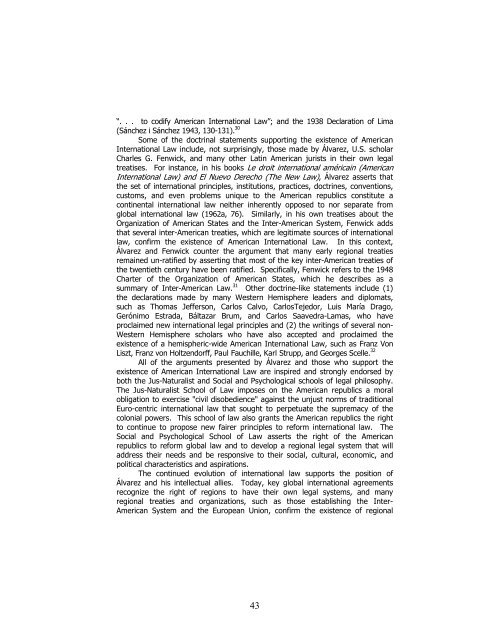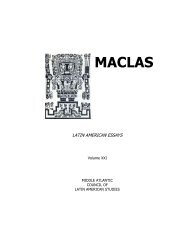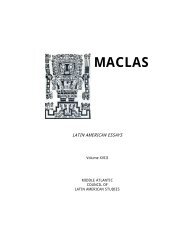latin american essays maclas
latin american essays maclas
latin american essays maclas
You also want an ePaper? Increase the reach of your titles
YUMPU automatically turns print PDFs into web optimized ePapers that Google loves.
“. . . to codify American International Law”; and the 1938 Declaration of Lima<br />
(Sánchez i Sánchez 1943, 130-131). 30<br />
Some of the doctrinal statements supporting the existence of American<br />
International Law include, not surprisingly, those made by Álvarez, U.S. scholar<br />
Charles G. Fenwick, and many other Latin American jurists in their own legal<br />
treatises. For instance, in his books Le droit international américain (American<br />
International Law) and El Nuevo Derecho (The New Law), Álvarez asserts that<br />
the set of international principles, institutions, practices, doctrines, conventions,<br />
customs, and even problems unique to the American republics constitute a<br />
continental international law neither inherently opposed to nor separate from<br />
global international law (1962a, 76). Similarly, in his own treatises about the<br />
Organization of American States and the Inter-American System, Fenwick adds<br />
that several inter-American treaties, which are legitimate sources of international<br />
law, confirm the existence of American International Law. In this context,<br />
Álvarez and Fenwick counter the argument that many early regional treaties<br />
remained un-ratified by asserting that most of the key inter-American treaties of<br />
the twentieth century have been ratified. Specifically, Fenwick refers to the 1948<br />
Charter of the Organization of American States, which he describes as a<br />
summary of Inter-American Law. 31 Other doctrine-like statements include (1)<br />
the declarations made by many Western Hemisphere leaders and diplomats,<br />
such as Thomas Jefferson, Carlos Calvo, CarlosTejedor, Luis María Drago,<br />
Gerónimo Estrada, Báltazar Brum, and Carlos Saavedra-Lamas, who have<br />
proclaimed new international legal principles and (2) the writings of several non-<br />
Western Hemisphere scholars who have also accepted and proclaimed the<br />
existence of a hemispheric-wide American International Law, such as Franz Von<br />
Liszt, Franz von Holtzendorff, Paul Fauchille, Karl Strupp, and Georges Scelle. 32<br />
All of the arguments presented by Álvarez and those who support the<br />
existence of American International Law are inspired and strongly endorsed by<br />
both the Jus-Naturalist and Social and Psychological schools of legal philosophy.<br />
The Jus-Naturalist School of Law imposes on the American republics a moral<br />
obligation to exercise "civil disobedience" against the unjust norms of traditional<br />
Euro-centric international law that sought to perpetuate the supremacy of the<br />
colonial powers. This school of law also grants the American republics the right<br />
to continue to propose new fairer principles to reform international law. The<br />
Social and Psychological School of Law asserts the right of the American<br />
republics to reform global law and to develop a regional legal system that will<br />
address their needs and be responsive to their social, cultural, economic, and<br />
political characteristics and aspirations.<br />
The continued evolution of international law supports the position of<br />
Álvarez and his intellectual allies. Today, key global international agreements<br />
recognize the right of regions to have their own legal systems, and many<br />
regional treaties and organizations, such as those establishing the Inter-<br />
American System and the European Union, confirm the existence of regional<br />
43




